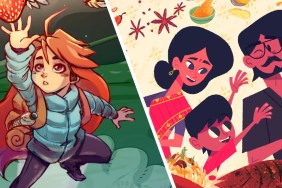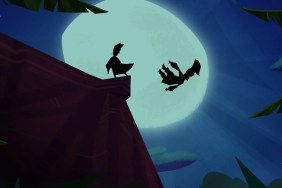A rubber dog with a pulley in the middle.
The lexicon of pirate insults is littered with canine epithets. Scurvy dog. Mangy cur. Freckled whelp. Pretty much any nasty-sounding adjective can be paired with some synonym for a dog to create some of piracy’s greatest verbal kicks to the groin. Perhaps the recipients of one too many of these four-legged jibes, the creators of Jolly Rover (just one guy, really) have taken those insults literally and made a game using a full cast of anthropomorphic pirate dogs.
[image1]Jolly Rover owes much to the resurgence in point-and-click adventures spearheaded by the work of Telltale Games and the re-release of The Secret of Monkey Island. Perhaps the greatest sign of Jolly Rover’s faithfulness to its swashbuckling source material is that it commandeers—should I say “pirates”?—the plot, humor, and puzzles of the original Monkey Island games.
A few early references in Jolly Rover tip the hat to Ron Gilbert’s classic PC game; for example, Jolly Rover’s real name is “Gaius”, and you’ll come across the requisite “second biggest monkey head” joke. At first, it merely feels like tasteful homage. But soon, the allusions pile up to the point where the constant winks and nods suggest an absence of unique ideas. The first time I heard Jolly utter a fearful “Yipe!” I chuckled at the memory of Guybrush Threepwood’s favorite expression. But by the third or fourth time I heard it, I wasn’t sure if it was supposed to be funny, reverential, or just plain grating.
The problem is that Jolly Rover takes the least interesting parts from the Monkey Island series—like the stream of familiar one-liners—without looking closely at what made those games so compelling in the first place: a deep sense of character, a love for all things pirate-related, sharp dialogue, beautiful artwork and animation, and a wickedly inventive taste for puzzle solving.
In Jolly Rover, we can see all too clearly what led to the near extinction of point-and-click adventures the first time around. You enter a new area, click on every object in the room, use one or two objects on something else, and move to the next screen. It’s repetitive and predictable to the point of absurdity. You see a barrel. *Click!* “Oh, look, a cracker!” Then you see a stone. *Click!* “Oh, look, a pirate journal!”
[image2]But this isn’t to say Jolly Rover doesn’t have its strengths. The music and voice work are great, and some of the puzzles are moderately challenging. Unfortunately, most of the best puzzles are lifted straight from Gilbert and company’s designs. For example, the shrunken head guide in Monkey Island becomes a magic conch, and the voodoo recipe becomes a… well, it stays a voodoo recipe in Jolly Rover. Worse, each of these puzzles is used multiple times in the game, showing less and less imagination each time.
There’s also a built-in hint system in the form of a cracker-loving parrot (A parrot who loves crackers! How zany!), which means you’ll never be stuck for more than a minute or two. But because of this streamlined approach to puzzle solving, there are more than a few solutions that are inconsistent with the game’s own logic, practically requiring you to ask the parrot in your pocket for help.
But for all that, it’s great to see a classic point-and-click title that plays according to the old rules. It’s a great trip down memory lane, even if it is someone else’s memory. The central conceit of the game—pirates are literally dogs—is rife with potential material, but unfortunately it never leads to more than a couple of “bitch” jokes and the expected “scurvy dog” insults. While at least some of its shortcomings might be explained by its small development team, it’s also worth remembering that the original Monkey Island was made by an equally small team.
Jolly Rover is like a dream that Guybrush may have had after a particularly raucous night spent drinking grog and eating dog biscuits. It’s a Bizarro World version of Monkey Island where you see the same characters and events, only they’re all dogs. I half expected at the end of the game to see Guybrush waking up, shaking off the delirium, looking at the screen, and sadly muttering something about how much he misses his puppy “Snoodles".
As a reminder of what was, Jolly Rover is a great diversion. But up against the smarmier, sassier, sharper, and quick-witted-er Telltale games (or even worse, compared to the old LucasArts ones), it’s also a reminder of what separates a good point-and-click adventure from a mediocre one.
-
House trained
-
Loyal to point-and-click fans
-
Doggedly follows its influences
-
No new tricks
-
Spotty puzzle design











